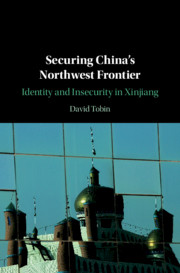Crossref Citations
This Book has been
cited by the following publications. This list is generated based on data provided by Crossref.
Zenz, Adrian
2021.
‘End the dominance of the Uyghur ethnic group’: an analysis of Beijing’s population optimization strategy in southern Xinjiang.
Central Asian Survey,
Vol. 40,
Issue. 3,
p.
291.
Gallagher, Adrian
2021.
To Name and Shame or Not, and If So, How? A Pragmatic Analysis of Naming and Shaming the Chinese Government over Mass Atrocity Crimes against the Uyghurs and Other Muslim Minorities in Xinjiang.
Journal of Global Security Studies,
Vol. 6,
Issue. 4,
2021.
Terror Capitalism.
p.
221.
2021.
Terror Capitalism.
p.
31.
2021.
Terror Capitalism.
p.
243.
2021.
Terror Capitalism.
p.
61.
2021.
Terror Capitalism.
p.
189.
2021.
Terror Capitalism.
p.
231.
2021.
Terror Capitalism.
p.
133.
2021.
Terror Capitalism.
p.
1.
Bulag, Uradyn E.
2021.
Minority Nationalities as Frankenstein’s Monsters? Reshaping “the Chinese Nation” and China’s Quest to Become a “Normal Country”.
The China Journal,
Vol. 86,
Issue. ,
p.
46.
2021.
Books received.
The China Quarterly,
Vol. 245,
Issue. ,
p.
314.
2021.
Terror Capitalism.
p.
95.
2021.
Terror Capitalism.
p.
163.
Vickers, Edward
and
Morris, Paul
2022.
Accelerating Hong Kong’s reeducation: ‘mainlandisation’, securitisation and the 2020 National Security Law.
Comparative Education,
Vol. 58,
Issue. 2,
p.
187.
Spivey, Brian
2022.
The December 12th Student Movement: Uyghur Student Protest in Reform-Era China.
The Journal of Asian Studies,
Vol. 81,
Issue. 4,
p.
727.
Tenzin, Jinba
2022.
Rethinking the Rise of China: A Postcolonial Critique of China and a Chinese Critique of the Postcolonial.
Journal of Historical Sociology,
Turner, Oliver
2022.
Frontiering International Relations: Narrating US Policy in the Asia Pacific.
Foreign Policy Analysis,
Vol. 18,
Issue. 2,
Tenzin, Jinba
2022.
Rethinking the Rise of China: A Postcolonial Critique of China and a Chinese Critique of the Postcolonial.
Journal of Historical Sociology,
Vol. 35,
Issue. 1,
p.
83.
Alpermann, Björn
2023.
China’s peripheries: the cases of Tibet and Xinjiang.
Open Research Europe,
Vol. 3,
Issue. ,
p.
86.



